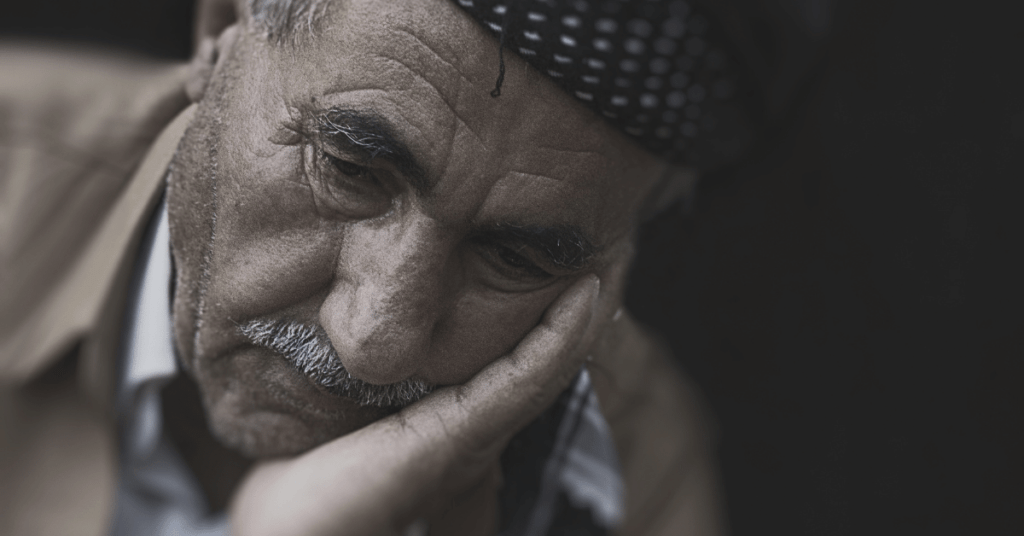Contents
Elder Abuse And Neglect
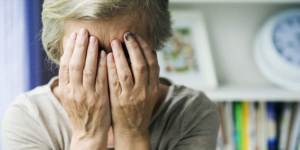
The topic of elder abuse is a difficult one to talk about. There are many misconceptions surrounding it. But the truth is that this type of abuse is much more prevalent than you think. The elderly population can be especially vulnerable to abusers. Because they are often isolated from family members and friends. So they have nobody around to see or stop any types of abuse. Furthermore, people with disabilities are often neglected by caregivers. It leads to isolation and other abusive behaviors being taken advantage of. This article will explore elder abuse in depth along with its prevention methods to help end the cycle.
Elder abuse is a problem worldwide, not just in the United States. Unfortunately, it is also one of the most underreported crimes, with statistics showing only about one in every 14 cases being reported. This makes it difficult to determine how often these types of crimes occur since family members or caregivers may be reluctant to report them.
Forms Of Elder Abuse And Neglect
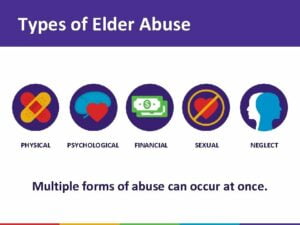
Elder abuse can be physical, psychological, or both. In addition, it can take the form of neglect, for instance by withholding needed medication or not providing enough food. There are 7 types of elder abuse:
Physical Abuse
There are many forms of elder abuse which include physical, emotional, sexual, and neglect. Physical includes everything from slapping to suffocation. This type includes hitting someone with a cane, shoving them, slapping them, and tying them up to a chair.
Sexual Abuse
This is any unwanted contact that is sexual in nature or that targets a person’s sexuality including forced sex or demanding to engage in sexual activity as a condition of receiving services from an abuser. Sexual is anything involving a person’s sexuality.
Emotional Abuse
Examples include swearing at the elderly person and telling them they are worthless or making fun of their disabilities or health problems without their consent. Emotional is things like humiliation and threats
Financial
This is a common type of abuse and involves stealing money, property, or possessions from an older person as well as forcing them to access their funds early such as taking out cash advances on credit cards.
Neglect
This form simply means withholding services that are needed such as medication or failing to provide food and clean clothes. The most common types of elder neglect include failure to provide for daily needs such as food and water, poor hygiene management, lack of proper medical treatment which can lead to pain and suffering, allowing bedsores to develop through inactivity, and failure to provide proper clothing.
Abandonment
This is when a person leaves their elderly loved one alone and unsupervised for extended periods of time so they don’t receive care or attention.
Self-neglect
This occurs when the elder neglects themselves by not paying bills, taking medications, or allowing themselves to become dirty and unkempt. And neglect is simply withholding needed care such as medication or nourishment.
Signs Of Elder Abuse
 Recognizing the signs of elder abuse include changes in physical or mental status. An unexpected visit from someone close to your loved one that you have never met before, sudden withdrawal from social activities, depression, and their health is declining. Other signs may involve financial exploitation, changes in wills or legal documents, and reluctance to speak up about abuse.
Recognizing the signs of elder abuse include changes in physical or mental status. An unexpected visit from someone close to your loved one that you have never met before, sudden withdrawal from social activities, depression, and their health is declining. Other signs may involve financial exploitation, changes in wills or legal documents, and reluctance to speak up about abuse.
If you suspect that your loved one has been abused. Then it’s important to act fast since this kind of mistreatment can lead to serious injury or even death if not addressed quickly enough. Take action by contacting the police if necessary since they will be more equipped to investigate these kinds of crimes the average citizen would be able to handle.
Forms of elder abuse include neglect, physical abuse, emotional abuse, verbal abuse, sexual abuse, financial exploitation, and abandonment. Neglect includes withholding food or medical care; physical involves hitting or restraining someone against their will; emotional involve name-calling or insults; sexual involves anything related to a person’s sexuality including rape or molestation; financial exploitation is the use of someone else’s funds without their approval, and abandonment takes place when people leave an elderly relative behind with no means to take care of themselves.
Physical Signs Of Elder Abuse
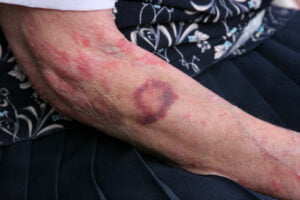 Physical signs of elder abuse include bruising, broken bones, cuts and bleeding, burns or scalding, malnutrition, dehydration, and inappropriate use of restraints such as chains or ropes. Signs of emotional abuse may include withdrawal from social activities and isolation, anxiety and fearfulness particularly when a specific person is nearby, depression, and regressive behavior such as thumb-sucking or excessive crying in younger people. Sexual signs involve genital bruising or sexually transmitted diseases due to forced sexual activity. Other signs may be pregnancy in females where the fetus has not reached term age yet. Financial exploitation includes sudden changes in bank accounts with withdrawals made without permission by an authorized user such as an elderly relative having funds stolen through forgery or embezzlement.
Physical signs of elder abuse include bruising, broken bones, cuts and bleeding, burns or scalding, malnutrition, dehydration, and inappropriate use of restraints such as chains or ropes. Signs of emotional abuse may include withdrawal from social activities and isolation, anxiety and fearfulness particularly when a specific person is nearby, depression, and regressive behavior such as thumb-sucking or excessive crying in younger people. Sexual signs involve genital bruising or sexually transmitted diseases due to forced sexual activity. Other signs may be pregnancy in females where the fetus has not reached term age yet. Financial exploitation includes sudden changes in bank accounts with withdrawals made without permission by an authorized user such as an elderly relative having funds stolen through forgery or embezzlement.
Emotional Abuse Signs
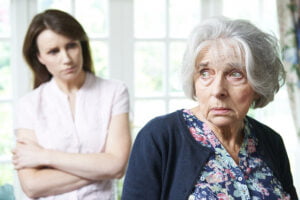 Emotional signs include withdrawal from social activities and isolation, anxiety, and fearfulness. Particularly when a specific person is nearby, depression, and regressive behavior such as thumb-sucking or excessive crying in younger people. Sexual signs involve genital bruising or sexually transmitted diseases due to forced sexual activity. Financial exploitation involves sudden changes in bank accounts with withdrawals made without permission by an authorized user. Such as an elderly relative having funds stolen through forgery or embezzlement.
Emotional signs include withdrawal from social activities and isolation, anxiety, and fearfulness. Particularly when a specific person is nearby, depression, and regressive behavior such as thumb-sucking or excessive crying in younger people. Sexual signs involve genital bruising or sexually transmitted diseases due to forced sexual activity. Financial exploitation involves sudden changes in bank accounts with withdrawals made without permission by an authorized user. Such as an elderly relative having funds stolen through forgery or embezzlement.
When it comes to justice, almost every state has passed laws that address the problem of elder abuse. But many cases end up being handled in civil courts. In some cases, false allegations have been made against family members who were already trying to care for an elderly relative. No matter what you hear from others about these kinds of crimes, never be afraid to stand up for yourself. If you feel someone is threatening or harming you or a loved one.
Who Abuses The Elderly?
Studies have shown that just over one-third of the abusers are family members which include sons, daughters, spouses, and other relatives. More than half of all cases of elder abuse involve neglect while around 16% are due to physical abuse. As for financial abuse, 80% of the time it is committed by family members.
The risk of elder abuse can increase in homes where there are multiple older people such as nursing home settings and hospitals. In the case of nursing homes, one study found that 5% of residents experienced some kind of neglect while 8% suffered from financial exploitation. As for hospital settings, reports show that nearly 50% of all adult patients who end up in a hospital for longer than 30 days will experience some form of mistreatment and neglect.
Risk Of Elder Abuse
Elder abuse and neglect can be carried out by anyone but there are some people who are more likely to do it than others. These can include:
- Relative or someone close to the older person
- Someone else who lives with the older person
- A paid carer, home help, health visitor, nurse, or doctor’s practice nurse
- Friend or neighbor of the older person
- Anyone else who has regular contact
If you think that elder abuse and neglect might have happened. Then you should report it to your local adult protection services. Even if they cannot help immediately.
If you have a loved one who is elderly and they are being mistreated. Or if you suspect that someone close to them may be abusing or neglecting an elder person in some way. There are legal protections available. In the United States, for example, it’s illegal to abuse any adult aged 18+. Regardless of whether they live at home with their family members or not. There are also many organizations dedicated to helping those suffering from elder abuse and neglect find justice.
It can be hard for people to deal with these issues day-to-day. But thankfully we now know more about handling elder abuse and neglect. This means that it’s easier to report these issues when you see them. So everyone can get the help they need quicker.
How Can You Stop This Cycle Of Abuse?
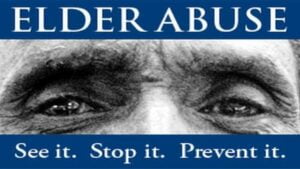
There are many things you can do to prevent elder abuse before it starts. Such as having your elderly relatives sign up with state-licensed agencies. So they don’t receive care from simply anyone who calls themselves a caregiver.
You can also have them remain in their homes whenever possible. Since they are familiar with the surroundings and have access to various amenities. This can go a long way towards preventing elder abuse. Because it is less likely for older people to experience neglect or other forms of mistreatment. If they are living in familiar locations.
Another way you can stop elder abuse is by being aware of different signs that may indicate your loved one is being abused. Such as not eating, sleeplessness, depression, withdrawal, or changes in hygiene. By looking out for signs of abuse yourself, you will be more likely to put an end to it and assist your elderly relatives when needed.
Where Can Elder Abuse May Happen?
Elder abuse can take place in nursing homes or other assisted living facilities under the care of people who are not family members. Preventing elder abuse should start with educating yourself. So you know what to look for when someone you love is being mistreated. Identifying the signs of elder neglect and getting your loved one to a safe place are key parts of stopping this kind of mistreatment before it goes too far.
Elder abuse can take place in nursing homes or other assisted living facilities under the care of people who are not family members. It can also take place when a caregiver becomes the sole source of support for their loved one and is unable to cope with stresses related to this role. Identifying the signs of elder neglect and getting your loved one to a safe place are key parts of stopping this kind of mistreatment before it goes too far.
If you suspect that your loved one has been abused then it’s important to act fast. This kind of mistreatment can lead to serious injury or even death if not addressed quickly enough. Take action by contacting the police if necessary. Since they will be more equipped to investigate these kinds of crimes the average citizen would be able to handle them.
Is There A System In Place To Stop Elder Abuse?
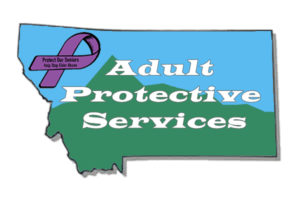 It is important to recognize that elder abuse is common. And there are different ways you can help an elderly loved one stay safe. However, it still remains a problem due to the fact that around six out of every ten cases of mistreatment go unreported according to some reports. This means that many cases of elder abuse may not be investigated or resolved which helps perpetuate the cycle of abuse.
It is important to recognize that elder abuse is common. And there are different ways you can help an elderly loved one stay safe. However, it still remains a problem due to the fact that around six out of every ten cases of mistreatment go unreported according to some reports. This means that many cases of elder abuse may not be investigated or resolved which helps perpetuate the cycle of abuse.
The sad truth is that just over 50% of cases involve family members. So this means people who are closest to older relatives are more likely to be responsible for their mistreatment than strangers. As such, it’s important for everyone in the community to learn about signs of possible elder abuse. So they can act before get any worse.
With the aging of our population, prevention and early detection are crucial. One study showed that over 96% of elder abuse cases take place at the hands of family members. So it is important for people to keep their guard up both during personal interactions as well as professional services such as caregiving.
Reporting Elder Abuse
It is important to report elder abuse and neglect because it can be a crime. So you need to tell someone like the police or a social worker. You will also need to give details about the type of abuse and neglect that has happened and who it was who caused it. The local Citizen’s Advice Bureau, Elder Abuse Helpline, and the police will be able to say if these kinds of support exist locally. If there is no one who can help then you should get advice from your doctor or nurse, GP surgery, or health visitor about where else to go for this kind of help.
You do not have to be sure that it was a crime before you report the abuse and neglect. But there needs to be a good reason why you think it is possible. If someone does not want to accept your help about reporting elder abuse and neglect they should get other help themselves. You should report any criminal offense to the police as well, even if it is about an adult. The law in most countries says that anyone aged 18 or over is legally responsible for looking after themselves and taking care of their own affairs. If someone does not look after themselves properly then it might be a crime under the law in your country.
Where To Report Elder Abuse?
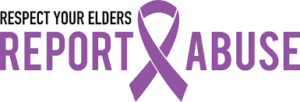
There may be laws in your country which say who can report elder abuse and neglect – or these people might already know where to go for this kind of help safely. If there are no such people then you should find out if adult protection services exist and how you can contact them. For example, there could be:
- An office on adult protection provides social workers to look after vulnerable adults
- A home treatment unit that looks after people in their own homes
- Social services department that provides a home help service
In some countries, there may also be an official body for reporting elder abuse and neglect. Again you should ask someone who knows where it is safe to report elder abuse and neglect for this kind of information.
You do not have to give your name when you make a report about elder abuse and neglect. But it might be helpful to do so. It will probably help the people who deal with elder abuse and neglect. If they can meet you somewhere safe- like their office.
If this means that older adults are not physically or mentally able to protect themselves. Then it could be possible to take away some of their rights. But only when other ways have been tried first. This kind of step also needs to be carried out by a judge and looked at again in court. If someone wants to make sure they are doing the right thing. If you think that adult protection services need to know about elder abuse and neglect. Then these kinds of issues can be very important for them too when looking at what has happened.
Why The Elderly Do Not Report Abuse?
For example, if an older person says that they do not want to accept help or they refuse to support. Then it might still be possible for someone like the police or social worker to take steps because of their lack of capacity. If this is so, it may mean that:
- People can stop worrying about having to prove what is and isn’t true before reporting elder abuse and neglect
- It helps everyone who is involved with older adults to look at things in a clearer way
- There might be less chance of disagreements between different people about what has happened and who is to blame
- People still need their rights protected if they are not able to care for themselves properly. It is important for everyone who looks after or helps out an older adult to understand this. So that elder abuse and neglect can be dealt with more quickly and safely.
It is a crime when someone makes you feel unsafe, frightened or threatened. Because of your age – regardless of where you live. If you think this has happened it is important to remember that the law protects every person regardless of their sex, race, disability, sexuality, or religion. All these kinds of discrimination are illegal.
Conclusion
If you suspect that your loved one has been abused. Then it’s important to act fast since this kind of mistreatment can lead to serious injury. Or even death if not addressed quickly enough. Take action by contacting the police if necessary. Since they will be more equipped to investigate these kinds of crimes the average citizen would be able to handle them.
For more information, please contact MantraCare. Abuse is a serious and harmful behavior that can cause physical, emotional, or psychological harm to a person. If you have any queries regarding Online Counseling experienced therapists at MantraCare can help: Book a trial Online therapy session
